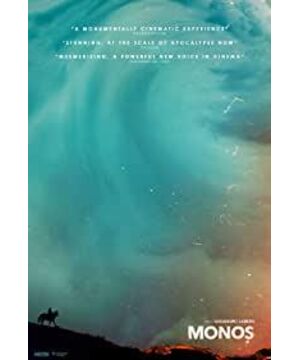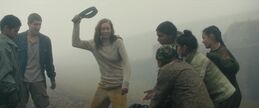At the beginning of this year, a film rushed out at the Sundance International Film Festival and detonated word of mouth, and won the Special Jury Award for Drama in the World Film Section of the Sundance International Film Festival .
Then it was shortlisted for the panorama unit of the Berlin International Film Festival , and it was still a big hit in Berlin.
In fact, as early as last year's Cannes Film Festival, this new film has already attracted much attention. The major media "Variety" and "Silver Screen" that have paid close attention to the Cannes Film Festival have included this film in the main competition prediction list of Cannes this year , but for some unknown reason, the film was not selected for the European Film Festival. And went the way of the Sundance Independent Film Festival.
The film comes from a Colombian director , Alessandro Landes , who has only two feature-length feature films, and his personal introduction on Wikipedia is less than three and a half lines. The last work was "Porfirio" after its premiere at the Cannes Film Festival, and was shortlisted for the best picture at the Indian International Film Festival .
But considering the level of the Indian Film Festival, the next film will be directly predicted by major media to enter Cannes. The large-span progress made me involuntarily raise my expectations.
As a result, the film did not even go to the main competition in Berlin, but went directly to Sundance. After the world premiere of the Berlin Panorama Unit, many film critics exclaimed: This Panorama Unit film is better than 90% of the main competition films! That way I look forward to it even more.
To be able to see this film in the mainland so early, I would also like to thank this year's Beijing International Film Festival for introducing "Monkey" with lightning speed. It was shown in the "Midnight Surprise" section, I'm surprised, is this a horror movie?
It wasn't until I watched it that I understood why this film went the way of an independent film and was screened in the Midnight Surprise unit .
The entire film is an allegorical film about eight Colombian guerrilla teens guarding an American prisoner in an isolated teenage barracks.
A and B are a couple. B was promoted to the guerrilla captain by the instructors of this group of teenagers, and is responsible for organizing shifts to guard a female prisoner of war every day.
The only material for the team was a cow. C went too far during a carnival and beat the cow to death. For fear of being punished, they all fell into panic. Under tremendous psychological pressure, Captain B shot himself. In the chaos, D became the leader of this guerrilla group.
So D began to realize his ambition step by step, trying to take the entire guerrilla group to escape the constraints of the army and become the king himself. But D's dictatorial behavior aroused strong dissatisfaction from A and E, so the small team started a life-and-death hunt for each other in the tropical rain forest.
The story of the whole film takes place in an isolated fortress, and the eight teenagers of the entire fortress plus an American prisoner of war constitute a small social system. In this social system, there are soldiers, ambitions, cowards, rebels, and, of course, rebels. They are quite perfect.
This is a political fable about human nature.
The director puts all the people in an isolated environment and observes how their instinctive side of human nature bursts out in extreme environments, which looks a lot like a "Stanford Prison Experiment" -style movie.
When human beings, as a group, are in a state of disorganization, what will be the result? The conclusion that the Stanford Prison Experiment tells us is that as long as there are people, there are big and small rivers and lakes, no matter how many people there are or what they originally looked like.
In the Stanford Prison Experiment, people were artificially divided into classes, police and prisoners. In "Monkey", it seems that this kind of human intervention is eliminated, allowing the free release of human nature. Of course, the result of the release must be destruction.
This must be a theme that has been set in advance, and the director completes his own work within the framework of this theme . This reminds me of the films of Werner Herzog, one of the four German New Wave directors. His films tend to set an extreme state to observe the working mechanism of the whole society.
In "On Land Boat", he described the process of an explorer going to the Amazon rainforest to develop it, and discussed some fundamental changes that occurred when the civilization of human society entered the wilderness. There is a certain concern about the future development of human civilization in the transformation.
And this kind of worry, reflected in "Monkey", is the question of whether human civilization can still be maintained when it enters a wild state.
In the process of discussing human civilization, Herzog usually adds thinking about the operation mechanism of the whole society. In "Kaspar Hauser", he expresses the hypocrisy of the whole human civilization with a mocking tone.
"Monkey" does not have the grand perspective of Herzog. It focuses on a point, and excavates this point. The foothold of the excavation finally falls on human instinct.
The more violent the film goes to the back, the eight people chasing each other in the jungle is a battle of factions. If this factional battle is placed in the adult society, it will be a children's version of "Game of Thrones". Some people are ambitious, some people have hidden murderous intentions, some people are chasing cicadas, and some people are behind the oriole. It was frightening for a long time.
At this point, "Monkey" is quite a tribute to Francis Ford Coppola's "Apocalypse Now" . In Apocalypse Now, Coppola describes war, a state-to-state behavior, as a desire that human nature brings out of the womb, and human nature is selfish. And it is people who control the entire state apparatus, so war is actually the nationalization of contradictions between people.
The idea of "Monkey" is different. It focuses on people, but this kind of contradiction between people in extreme environments and the formation mechanism of the contradiction between countries are all derived from people brought out of the womb. primitive desire. So the generals who defected in "Apocalypse Now" took the method of killing to establish the Garden of Eden for mankind, but in the end they fell short.
The serenity and isolation displayed at the beginning of "Monkey" is shaping an Eden-like country, but we all know that such an Eden doesn't exist.
This is the most interesting part of "Monkey", and the use of sound is quite distinctive. These two places are actually the most distinctive places in the film, and they are also the places that make people look anxious. He set the film so that the teenagers were enclosed in a small area, which narrowed the pattern and made the film more complete, but also lost the possibility of digging the theme vertically.
Coupled with some bugs in the plot of the film, I can see that the director is still struggling to control the script.
The use of sound is very good , especially the sounds of rain and water that appear in the second half. The points that appear are very natural, and they basically match the mood of the characters that the director wants to express. Especially in the second half, the teenagers jumped into the river to swim, and waterfalls, mountain springs, and rainwater overlapped into an Eden-like painting. When the gunshots sounded and the water faded away, the shock you felt was beyond words.
However, there are still obvious flaws in the use of sound. The first half of the film is full of rumbling thunder, which is very distinctive when it appears once or twice, but when the thunder is used for the third time, it does sound very tired. As if the director has no fresh audiovisual language to use.
Of course, although the film has a lot of deficiencies and redundant information, the narrative and thematic expression of the film is still very high. For a director who has only made two feature films, it is already a surprise.
Continue to move forward in this style, and the director can meet in the main competition unit of Venice for the next film. (Actually, this one has already surpassed many films in Berlin this year.)
(The picture in the text comes from the Internet)
Author of Sharp Shadow Vanguard | Zhi Yuan Jun
✪▽✪Welcome to reprint, but be sure to indicate the source and author
View more about Monos reviews








